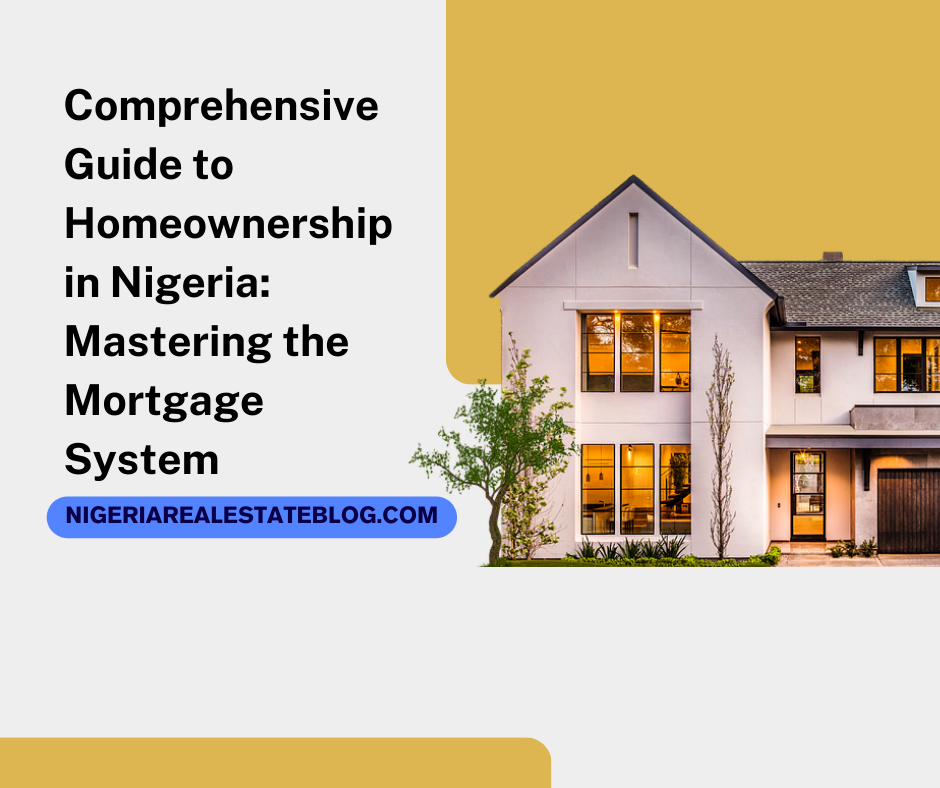
Comprehensive Guide to Homeownership in Nigeria: Mastering the Mortgage System
Achieving homeownership in Nigeria through a mortgage can be a complex but rewarding journey. This in-depth guide offers a detailed look at the mortgage system, including current interest rates, minimum loan amounts, leading mortgage providers, and a step-by-step process to secure a mortgage.
Understanding the Nigerian Mortgage System: The mortgage system in Nigeria, regulated by the Central Bank of Nigeria, involves various financial institutions offering home loans. These loans are typically repaid over 15 to 30 years.
Current Mortgage Interest Rates: As of 2023, mortgage interest rates in Nigeria generally range from 15% to 25% annually. These rates can vary based on the lender, loan amount, and the borrower’s creditworthiness.
Minimum Loan Amounts: The minimum loan amount for mortgages varies by lender. For instance, Union Bank of Nigeria offers mortgages starting from a certain threshold, with a minimum interest rate of 16% per annum.
Top Mortgage Providers in Nigeria:
- Union Bank of Nigeria: Offers mortgages up to 150 million naira at a minimum interest rate of 16% per annum, over a maximum tenure of 15 years.
- Federal Mortgage Bank of Nigeria (FMBN): Provides affordable loans through the National Housing Fund (NHF) scheme, catering to low and medium-income earners.
- Stanbic IBTC Bank: Known for its diverse mortgage options, catering to various customer segments.
- Access Bank Plc: Offers tailored mortgage products, focusing on affordability and flexibility.
- Zenith Bank Plc: Provides competitive mortgage rates with flexible repayment options.
Required Documents for a Mortgage:
- Application Form: Fully completed mortgage application form.
- Valid Identification: Government-issued ID (National ID, Passport, Driver’s License).
- Proof of Income: Recent payslips, bank statements, tax returns.
- Employment Verification: Official letter from your employer.
- Property Documents: Title documents, offer letter, sale agreement.
- Valuation Report: From an accredited property valuer.
- Credit Report: To assess credit history and score.
Detailed Steps to Obtaining a Mortgage:
- Financial Assessment: Carefully evaluate your financial status, focusing on income, expenses, and existing debts.
- Selecting a Mortgage Provider: Research and compare different lenders based on their rates, terms, and customer reviews.
- Property Selection: Identify a property that meets your needs and budget. Ensure the property is eligible for mortgage financing.
- Application and Documentation: Submit a detailed application along with all necessary documents. Be thorough to avoid delays.
- Approval Process: The lender will assess your application, conduct credit checks, and evaluate the property.
- Property Valuation: The lender will arrange for an official valuation to confirm the property’s market value.
- Legal and Financial Formalities: Review and sign the mortgage agreement. Understand all terms, including repayment schedule and any penalties.
- Closing the Deal: Pay the required down payment, usually 20-30% of the property’s value. Finalize the purchase and take ownership.
Challenges and Tips:
- High-Interest Rates: Shop around for the best rates and negotiate with lenders.
- Bureaucratic Processes: Be prepared for potential delays and seek legal advice when necessary.
- Limited Mortgage Products: Explore different products and choose one that best suits your financial situation.
Conclusion: While the path to owning a home through a mortgage in Nigeria can be intricate, it’s a feasible goal with the right preparation and knowledge. This guide aims to equip you with the necessary information to navigate the mortgage landscape confidently and make informed decisions on your journey to homeownership.


